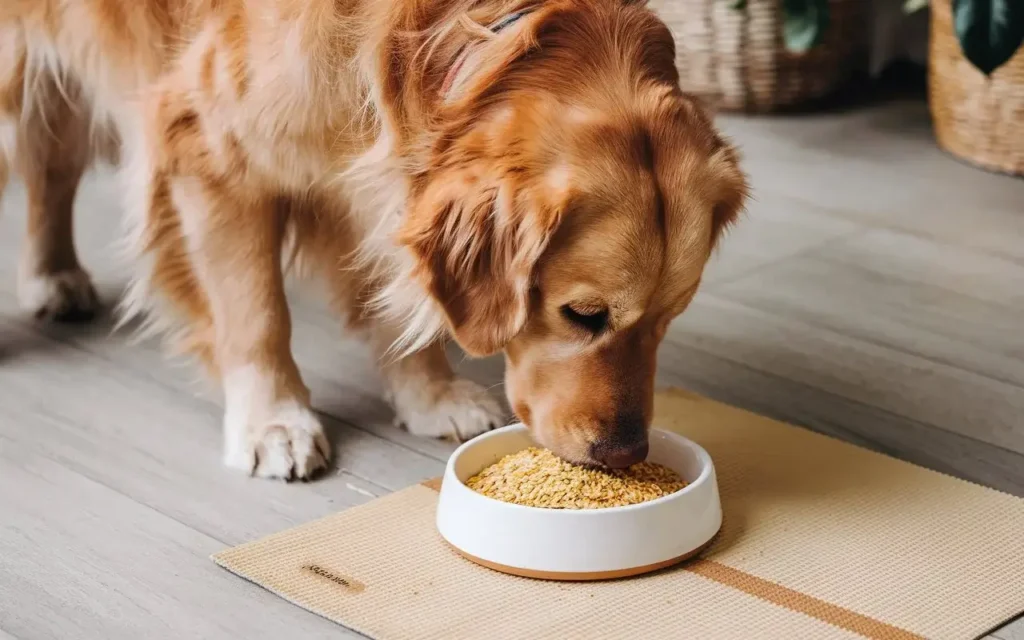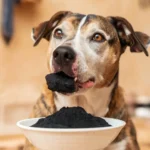Introduction: Can Dogs Have Nutritional Yeast?
As a pet owner, you’re always looking for ways to enhance your dog’s health and nutrition. One question that often arises is, “Can dogs have nutritional yeast?” This comprehensive guide will explore the benefits, potential risks, and proper usage of nutritional yeast for dogs. We’ll delve into everything you need to know about incorporating this nutrient-rich supplement into your furry friend’s diet.
What is Nutritional Yeast?
Before we answer the question, “Can dogs have nutritional yeast?” it’s essential to understand what nutritional yeast is and why it’s gaining popularity among health-conscious pet owners.
Definition and Origin
Nutritional yeast, otherwise popularly known as “nooch,” is a version of Saccharomyces cerevisiae yeast that has been deactivated. Unlike active yeasts used in baking, nutritional yeast has undergone a heating procedure and drying to make it inactive. It keeps its nourishing values but is incapable of fermentation, and also any yeast infection.
Nutritional Profile
Nutritional yeast is packed with essential nutrients, making it a popular supplement for both humans and pets. Here’s an overview of its nutritional composition:
- B-complex vitamins (including B12)
- Protein
- Fiber
- Minerals (zinc, selenium, manganese)
- Antioxidants

Can Dogs Have Nutritional Yeast? The Benefits
Now that we’ve established what nutritional yeast is, let’s address the primary question: Can dogs have nutritional yeast? The short answer is yes, dogs can have nutritional yeast in moderation. In fact, many pet owners and veterinarians recommend it as a beneficial supplement. Here’s why:
1. Improved Coat Health
One of the most noticeable benefits of giving your dog nutritional yeast is the improvement in their coat quality. The B-vitamins and minerals in nutritional yeast contribute to:
- Shinier fur
- Reduced shedding
- Healthier skin
2. Boosted Immune System
Can dogs have nutritional yeast to strengthen their immune system? Absolutely! The high content of antioxidants and B-vitamins supports:
- Enhanced immune function
- Better resistance to infections
- Faster recovery from illnesses
3. Increased Energy Levels
Many dog owners report increased vitality in their pets after incorporating nutritional yeast into their diet. This boost in energy can be attributed to:
- B-vitamins aiding in energy metabolism
- Improved nutrient absorption
- Enhanced overall health
4. Natural Flea Repellent
Interestingly, nutritional yeast may also act as a natural flea repellent. While it’s not a replacement for traditional flea treatments, it can be a helpful addition to your dog’s flea prevention routine.
5. Digestive Health Support
The fiber content in nutritional yeast can contribute to better digestive health for your dog. It may help with:
- Regulating bowel movements
- Supporting beneficial gut bacteria
- Improving nutrient absorption
Can My Dog Have Nutritional Yeast? Potential Risks and Precautions
Although there are many advantages of nutritional yeast for dogs, it’s vital to recognize possible risks and implement appropriate precautions. After all, every dog is unique, and what works for one may not be suitable for another.
Allergic Reactions
Some dogs may be allergic to yeast. If you’re curious, “Can my dog have nutritional yeast?” it’s essential to introduce it slowly and watch for any signs of allergic reactions, such as:
- Itching
- Redness of the skin
- Digestive upset
- Excessive paw licking
Overconsumption Risks
While nutritional yeast is generally safe, overfeeding can lead to problems. Potential issues from excessive consumption include:
- Bloating
- Gas
- Diarrhea
- Nausea
Interaction with Medications
If your dog is on any medications, especially those that affect blood sugar levels or have MAO inhibitors, consult with your veterinarian before adding nutritional yeast to their diet.
Yeast Infections
Despite being an inactive form of yeast, some pet owners worry about yeast infections. However, nutritional yeast is unlikely to cause yeast infections in dogs when given in appropriate amounts.

How to Safely Introduce Nutritional Yeast to Your Dog’s Diet
Now that we’ve addressed the question, “Can dogs have nutritional yeast?” and examined its advantages and possible drawbacks, let’s talk about the best ways to safely add it to your dog’s meals.
Start Slow
When introducing any new food or supplement, it’s crucial to start with small amounts. Begin with a tiny pinch and gradually increase the dosage over time.
Proper Dosage
The appropriate dosage of nutritional yeast for dogs depends on their size:
- Small dogs (under 20 lbs): 1/4 teaspoon per day
- Medium dogs (20-60 lbs): 1/2 teaspoon per day
- Large dogs (over 60 lbs): 1 teaspoon per day
Mixing Methods
There are several ways to incorporate nutritional yeast into your dog’s diet:
- Sprinkle it over their regular food
- Mix it into homemade dog treats
- Blend it into a smoothie or broth
Monitor Your Dog’s Response
After introducing nutritional yeast, closely observe your dog for any changes in behavior, appetite, or stool consistency. If you observe any negative effects, stop using it immediately and seek advice from your veterinarian.
Can Dogs Have Nutritional Yeast Flakes? Different Forms and Their Uses
Nutritional yeast comes in various forms, and a common question is, “Can dogs have nutritional yeast flakes?” Let’s explore the different forms and their applications:
Nutritional Yeast Flakes
Flakes are the most common form of nutritional yeast. They have a light, airy texture and a nutty, cheesy flavor that many dogs find appealing. Flakes are easy to sprinkle over food or mix into treats.
Powdered Nutritional Yeast
Powdered nutritional yeast has a finer texture than flakes, making it easier to blend into liquids or homemade dog food recipes. It’s also less noticeable if you have a picky eater.
Nutritional Yeast Tablets
Some brands offer nutritional yeast in tablet form. While these can be convenient, they may not be as palatable for dogs and could be mistaken for treats, leading to overconsumption.
Creative Ways to Use Nutritional Yeast in Your Dog’s Diet
Now that we’ve answered the question, “Can my dog have nutritional yeast?” let’s look at some imaginative methods to include it in their meals:
Homemade Dog Treats
Create nutritious homemade dog treats by incorporating nutritional yeast into the recipe. Here’s a simple idea:
- Mix whole wheat flour, mashed banana, peanut butter, and nutritional yeast
- Flatten the dough and cut it into various shapes
- Bake until golden brown
Flavor Enhancer
Use nutritional yeast as a flavor enhancer for bland dog food or medications:
- Sprinkle over kibble to make it more appealing
- Mix with wet food to boost flavor and nutrition
- Combine with pills or supplements to mask their taste
Nutritional Yeast Broth
Create a nutrient-rich broth by simmering vegetables and adding nutritional yeast:
- Use dog-safe vegetables like carrots, celery, and sweet potatoes
- Add a small amount of nutritional yeast to the cooled broth
- Serve as a hydrating treat or pour over dry food

Frequently Asked Questions About Dogs and Nutritional Yeast
To further clarify the topic of whether dogs can have nutritional yeast, let’s address some common questions:
1. Is nutritional yeast the same as brewer’s yeast?
No, nutritional yeast and brewer’s yeast are different products. While both are derived from Saccharomyces cerevisiae, they are processed differently and have distinct nutritional profiles.
2. Can nutritional yeast cause yeast infections in dogs?
Nutritional yeast is unlikely to cause yeast infections in dogs when given in appropriate amounts. It’s a deactivated form of yeast and doesn’t promote yeast overgrowth.
3. How long does it take to see benefits from giving dogs nutritional yeast?
The timeline for seeing benefits can vary depending on the dog and the specific benefit. Some owners report improvements in coat health within a few weeks, while other benefits may take longer to become apparent.
4. Can puppies have nutritional yeast?
While puppies can generally have nutritional yeast, it’s essential to consult with your veterinarian first. Puppies have different nutritional needs than adult dogs, and supplements should be introduced carefully.
5. Does nutritional yeast need to be refrigerated?
Nutritional yeast doesn’t require refrigeration if stored in a cool, dry place. However, refrigeration can extend its shelf life and preserve its nutritional value for longer.
Expert Opinions: What Veterinarians Say About Dogs and Nutritional Yeast
To provide a well-rounded perspective on whether dogs can have nutritional yeast, let’s consider what veterinary experts have to say:
Dr. Karen Becker, DVM
Dr. Becker, a proponent of natural pet health, states, “Nutritional yeast can be a beneficial supplement for dogs when used appropriately. Its rich nutrient profile can support overall health and well-being.”
Dr. Judy Morgan, DVM
Holistic veterinarian Dr. Morgan notes, “While nutritional yeast can offer many benefits for dogs, it’s crucial to introduce it slowly and monitor for any adverse reactions. Always check with your veterinarian before introducing new supplements into your dog’s diet.”
Dr. Gary Richter, DVM
Dr. Richter, an integrative veterinarian, advises, “Nutritional yeast can be a great addition to a dog’s diet, particularly for its B-vitamin content. Nevertheless, it shouldn’t replace a balanced diet, and moderation is essential.”
Alternatives to Nutritional Yeast for Dogs
While we’ve established that dogs can have nutritional yeast, some pet owners may prefer alternatives. Here are some other options that can provide similar benefits:
1. Spirulina
This blue-green algae is loaded with protein, vitamins, and minerals. It can support immune function and promote overall health in dogs.
2. Kelp
Kelp is a nutrient-dense seaweed that provides iodine, vitamins, and minerals. It may enhance thyroid function and contribute to a healthy coat.
3. Brewer’s Yeast
While different from nutritional yeast, brewer’s yeast offers similar benefits and is often used as a supplement for dogs.
4. Fish Oil
Rich in omega-3 fatty acids, fish oil can promote coat health, support joint function, and boost the immune system.
5. Probiotic Supplements
These can aid in digestive health and bolster immune function, much like the advantages provided by nutritional yeast.
Conclusion: Can Dogs Have Nutritional Yeast as Part of a Balanced Diet?
In conclusion, the answer to “Can dogs have nutritional yeast?” is a resounding yes, with some important caveats. When used appropriately, nutritional yeast can be a valuable addition to your dog’s diet, offering numerous health benefits:
- Improved coat health
- Boosted immune system
- Increased energy levels
- Potential flea repellent properties
- Support for digestive health
Nonetheless, it’s important to keep in mind that each dog is different. While many dogs can safely enjoy nutritional yeast, others may have sensitivities or allergies. Always introduce new supplements slowly and under the guidance of your veterinarian.
The key to success with nutritional yeast for dogs lies in moderation and careful observation. Start with small amounts, monitor your dog’s response, and adjust as needed. By doing so, you can harness the potential benefits of this nutrient-rich supplement while ensuring your furry friend’s safety and well-being.
Just keep in mind that nutritional yeast isn’t a replacement for a miracle cure or substitution for good nutrition and quality veterinary care. But when used responsibly, it is one more tool in your box of dog-parenting tools that could bring more joy in life to your dog.
As a responsible pet owner, your dog’s health is first. Keeping up to date with supplements like nutritional yeast yourself and with the help of your veterinarian will allow you to make the correct choice regarding their nutrition and health. After all, a healthy dog is a happy dog, and isn’t that what every pet owner is after?.








